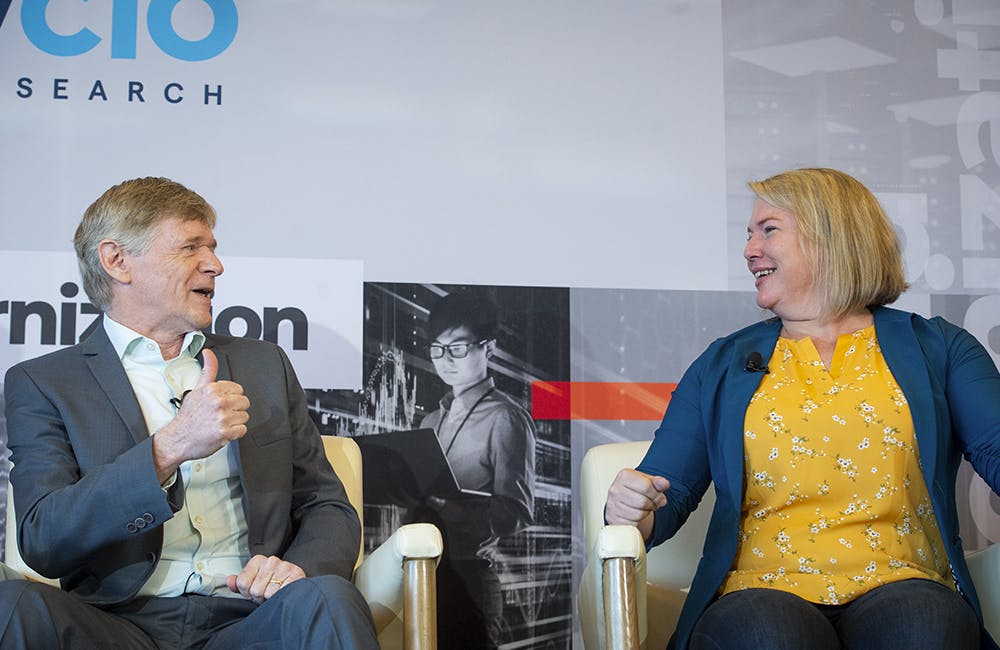Are Data Literacy Programs the Key to Data-Driven Decision-Making?
The Army is embracing data literacy training to empower personnel to leverage data.

Federal IT leaders have been aiming to make data a strategic asset across their agencies, and while acquiring tools and infrastructure is a boon in harnessing data, many are focusing on developing data literacy and a data-driven culture.
People, platforms, processes and culture are four critical areas for developing an organization that leverages data effectively, said Army People Analytics Deputy Director Lt. Col. Kristin Saling at GovCIO Media & Research’s Cloud Modernization event Thursday.
Amid these needs, the Army launched a data literacy program to help enable its workforce to work with data, as well as help foster a culture that embraces data in decision-making and business activities.
“We needed a base level of understanding for all soldiers, all civilians, everybody working in this space to be able to speak about data because we don’t have a career field that isn’t using data in some aspect,” Saling said. “We piloted a number of different programs. I think our most successful one right now is Army Data 101.”
The course is four days long, two and a half hours a day, and it aims to help personnel think more critically about data. Saling added that her team is looking to develop more hands-on courses for employees more interested in workshopping data-driven solutions for challenges across their organizations.
Denodo SVP Data Architecture and Chief Evangelist Paul Moxon also stressed the importance of data literacy training, adding that all agencies should be implementing similar programs.
“If you don’t understand the data, you’ll be led by the nose by somebody else who does understand data,” Moxon said. “You can need the people who can deliver the insights, but you have to be able to understand the insights. … It’s necessary because we are becoming a digital-driven community.”
Moxon added that it’s also important for data literacy training across the entire organization, not just the senior level, not just to leverage data across different business areas, but also to drive a more data-forward culture.
“People do tend to do things because they know and when you have people who are very experienced, this is the way they’ve always done it,” Moxon said. “This is the way we’re going to do it, and it’s getting them to think, ‘Okay, can I do something differently? Can I look at the data and actually come to a different conclusion, an alternative way of doing something?’ … You have to change that, and that’s part of what data literacy is.”
To build a culture that embraces use of data in business practices, Saling has also been highlighting the value of using data-backed solutions and decision-making. She touched upon the benefit of teaching how data-driven tools like automation can make small but meaningful impacts for different business activities.
“We’ve done a lot of this work at Human Resources Command with our career managers who are, for the most part, non-technical folks but have to manage a lot of data on their personnel,” Saling said. “Getting some tricks to do that a whole lot more easily than when they were doing it, when they were manually copying things over … that word starts spreading and start thinking about, talking about all the other cool things that we can build.”
Amid the data literacy and culture efforts, Saling and Moxon both encouraged a culture of iterative innovation and experimentation so that users and analysts can find a starting point in using data.
“You just need to unleash that innovation within the agency itself rather than bringing in consultants and things like that,” Moxon said. “The agencies themselves are the most innovative people that you have.”
This is a carousel with manually rotating slides. Use Next and Previous buttons to navigate or jump to a slide with the slide dots
-

Digital GI Bill Automation Speeds VA Benefits Delivery
VA officials said Digital GI Bill upgrades have improved claims speed, enabling the department to process benefits with fewer staff.
3m read -

Federal CIO: ‘The Shackles are Off’ for AI Innovation in Government
Federal CIO Gregory Barbaccia said the PMA encourages faster tech adoption, AI experimentation and simpler digital services for citizens.
3m read -

Tracking CIOs in Trump's Second Term
Stay informed on the latest shifts in federal technology leadership as new CIOs are appointed and President Trump's second term takes shape.
6m read -

QuantumCT Builds a Quantum Ecosystem for Drug Development
An NSF innovation finalist is working with industry and academia to apply quantum technologies to drug development.
3m read








